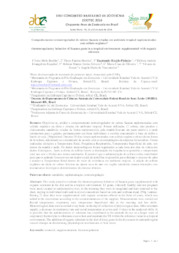Comportamento termorregulador de cabras Saanen criadas em ambiente tropical suplementadas com selênio orgânico.
Comportamento termorregulador de cabras Saanen criadas em ambiente tropical suplementadas com selênio orgânico.
Author(s): BOMFIM, J. M.; MARTINS, T. P.; PINHEIRO, R. R.; FAÇANHA, D. A. E.; SILVEIRA, R. M. F.; OLIVEIRA, M. C. de; SOUZA, V. de; VASCONCELOS, A. M. de
Summary: Resumo: Objetivou-se, avaliar o comportamento termorregulador de cabras Saanen suplementadas com selênio orgânico na dieta e criadas em ambiente tropical. Foram utilizadas 12 cabras, não prenhes e clinicamente saudáveis; criadas de forma semiextensiva, pela manhã ficavam em pasto nativo e à tarde retornavam para o galpão, permanecendo em baias individuais e recebia concentrado à base de milho e farelo de soja, 250g/animal. Durante 21 dias foram suplementadas com selênio orgânico oferecido na forma de levedura, adicionado ao concentrado de acordo com as recomendações da empresa fornecedora. Foram realizadas aferições a Temperatura Retal, Frequência Respiratória, Temperatura Superficial da pele, nos turnos da manhã e tarde. Os dados meteorológicos foram registrados a cada hora nos dias de coleta dos dados fisiológicos. Após a oferta de selênio houve a diminuição da frequência respiratória e temperatura retal aos sete e 14 dias nos turnos analisados. É possível que a administração do selênio tenha contribuído para que os animais fizessem uso em maior escala da termólise respiratória para eliminar o excesso de calor e manter a Temperatura Retal dentro do valor de referência em ambiente tropical. A adição do selênio orgânico na dieta de cabras leiteiras na época seca do ano em região semiárida causou alterações nos mecanismos fisiológicos determinantes do estresse térmico [Thermoregulatory behavior of Saanen goats in a tropical environment supplemented with organic selenium]. Abstract: This study aimed to evaluate the thermoregulatory behavior of Saanen goats supplemented with organic selenium in the diet and in a tropical environment. 12 goats, clinically healthy and not pregnant were used; created in semiextensiva way, in the morning they were in rangeland and later returned to the shed, staying in individual stalls and received concentrate based on corn and soybean meal, 250g / animal. During 21 days they were supplemented with organic selenium offered in the form of yeast, which was added to the concentrate according to the recommendations of the supplier. Measurements were carried out Rectal temperature, respiratory rate, temperature Superficial skin in the morning and late shifts. Meteorological data were recorded every hour, in the day of collection of physiological data. After selenium supply, a decrease in respiratory rate and rectal temperature at seven and 14 days in the analyzed shifts. It is possible that the administration of selenium has contributed to the animals do use on a larger scale of respiratory thermolysis to eliminate excess heat and maintain the TR within the reference value in a tropical environment. The addition of organic selenium in the diet of dairy goats in the dry season in semiarid region caused changes in determining physiological mechanisms of heat stress
Publication year: 2016
Types of publication: Paper in annals and proceedings
Unit: Embrapa Goats & Sheep
Keywords: Antioxidade, Antioxidants, Brasil, Brazil, Cabra leiteira, Caprino, Goats, Microelemento, Mineral supplements, Nordeste, Nutrição animal, Raça Saanen, Selenium, Selênio, Semiarid zones, Semiárido, Suplemento alimentar, Suplemento mineral, Supplementary feeding, Termorregulação, Thermoregulation, Trace elements
Observation
Some of Embrapa's publications are published as ePub files. To read them, use or download one of the following free software options to your computer or mobile device. Android: Google Play Books; IOS: iBooks; Windows and Linux: Calibre.
Access other publications
Access the Agricultural Research Database (BDPA) to consult Embrapa's full library collection and records.
Visit Embrapa Bookstore to purchase books and other publications sold by Embrapa.

